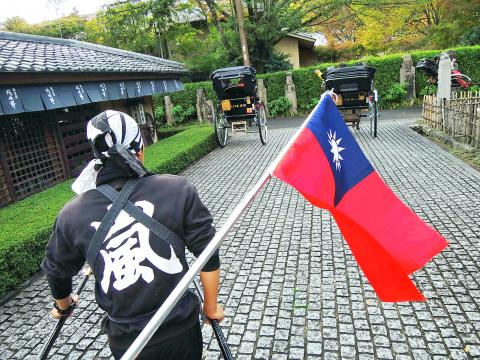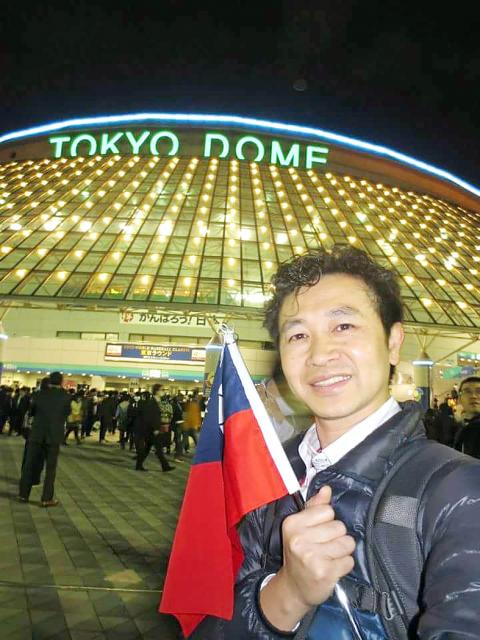Taiwanese guide Hsieh Ming-huang (謝銘煌) has taken to using the nation’s flag to guide groups of Taiwanese tourists in Japan, as he says it is a useful way to shepherd his charges and to promote the nation abroad.
A graduate of Okinawa University who lived in Japan prior to becoming a tour guide, Hsieh said that it is unusual to see Taiwan’s national flag in Japan, and he brings at least one with him whenever he leads a tour.
For more than 17 years, Hsieh has led tour groups to many of Japan’s most famous sites — such as Arashiyama in Kyoto, Otarushi in Hokkaido and many places in Tokyo — while waving the national flag.

Photo copied by Huang Hsu-lei, Taipei Times
When people asked him what flag it was and if he had any spares, Hsieh said he does not hesitate to pull one out of his backpack and give it to them saying: “I am from Taiwan and this is our national flag.”
He always has plenty of flags to give away, Hsieh said, adding that Chinese tourists have sometimes asked him if the flag is the party flag of the Chinese Nationalist Party (KMT).
Hsieh said he always replies that it is the Republic of China (ROC) flag.

Photo courtesy of Hsieh Ming-huang
The distinction between the ROC national flag and the KMT party flag is minimal and distinguished only by the size of the emblem.
Hsieh said that he was in Tokyo during a 2013 baseball match between Taiwan and Japan and cheered on the Taiwanese team by waving the national flag in the stadium.
The loss to Japan had been hard to swallow, Hsieh said, adding that all he could do at the time was to wave the flag harder.
As for the reason why he started using the national flag to lead the tour groups instead of flags issued by the tour agency, Hsieh said that the agency flags did not include the name “Taiwan” on the flags and were not unique.
“I wanted to stand out in the crowd and allow group members to find me easily, and to inspire pride,” he said.
Many stores have asked him for a flag, Hsieh said, adding that they might also want to make Taiwanese tourists feel more at home.

Beijing could eventually see a full amphibious invasion of Taiwan as the only "prudent" way to bring about unification, the US Department of Defense said in a newly released annual report to Congress. The Pentagon's "Annual Report to Congress: Military and Security Developments Involving the People's Republic of China 2025," was in many ways similar to last year’s report but reorganized the analysis of the options China has to take over Taiwan. Generally, according to the report, Chinese leaders view the People's Liberation Army's (PLA) capabilities for a Taiwan campaign as improving, but they remain uncertain about its readiness to successfully seize

Taiwan is getting a day off on Christmas for the first time in 25 years. The change comes after opposition parties passed a law earlier this year to add or restore five public holidays, including Constitution Day, which falls on today, Dec. 25. The day marks the 1947 adoption of the constitution of the Republic of China, as the government in Taipei is formally known. Back then the Chinese Nationalist Party (KMT) governed China from Nanjing. When the KMT, now an opposition party in Taiwan, passed the legislation on holidays, it said that they would help “commemorate the history of national development.” That

Taiwan has overtaken South Korea this year in per capita income for the first time in 23 years, IMF data showed. Per capita income is a nation’s GDP divided by the total population, used to compare average wealth levels across countries. Taiwan also beat Japan this year on per capita income, after surpassing it for the first time last year, US magazine Newsweek reported yesterday. Across Asia, Taiwan ranked fourth for per capita income at US$37,827 this year due to sustained economic growth, the report said. In the top three spots were Singapore, Macau and Hong Kong, it said. South

Snow fell on Yushan (Jade Mountain, 玉山) yesterday morning as a continental cold air mass sent temperatures below freezing on Taiwan’s tallest peak, the Central Weather Administration (CWA) said. Snowflakes were seen on Yushan’s north peak from 6:28am to 6:38am, but they did not fully cover the ground and no accumulation was recorded, the CWA said. As of 7:42am, the lowest temperature recorded across Taiwan was minus-5.5°C at Yushan’s Fengkou observatory and minus-4.7°C at the Yushan observatory, CWA data showed. On Hehuanshan (合歡山) in Nantou County, a low of 1.3°C was recorded at 6:39pm, when ice pellets fell at Songsyue Lodge (松雪樓), a